ATHENS (Reuters) - Greece's government on Monday brought forward a crucial presidential vote by two months, in a surprise move after securing a two-month extension of its bailout programme.
The government said it had asked for parliament to move quickly so that the vote to elect a new president could be held on Dec. 17. The process was initially due to begin on Feb. 15.
The presidential vote has created uncertainty in Greece for months as failure to elect a president would lead to snap elections and political instability.
Prime Minister Antonis Samaras needs the support of opposition lawmakers for his party's candidate to win the presidential election.
Greek law stipulates that parliament must be dissolved and new elections called if it cannot elect a president, which requires approval by 180 lawmakers in the 300-seat chamber.
Samaras's conservative-leftist coalition currently has 155 lawmakers in parliament, but hopes to draw support from independent parties to get 180 votes for its candidate.
Greece will on Tuesday ask for a two-month extension to its bailout programme and the euro zone is in favour of granting it, Eurogroup chief Jeroen Dijsselbloem said on Monday.
In a statement, the government blamed the leftist opposition for undermining efforts to seal a deal with lenders on the bailout.
"Unfortunately, the open encouragement of the lawmakers by the main opposition to deter the election of a president and lead the country to snap elections undermines Greece's negotiating position and sends signals of uncertainty to the markets," government spokeswoman Sofia Voultepsi said in a statement.

Samaras had staked his political survival on an early exit from the EU/IMF aid programme, which is deeply unpopular in Greece as it requires austerity measures, but the plan ran into trouble as Athens and its lenders haggled over next year's budget.
(Reporting by Angeliki Koutantou, writing by Deepa Babington,; editing by Ralph Boulton and Susan Fenton)